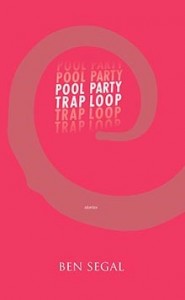136 pages, $16.95
Review by Michael Vegas Mussman
What is up with palindromes? Seems like any palindrome longer than “racecar” is unwieldy both to sense and to sound. Plus, they’re fake. “Able was I, ere I saw Elba,” Napoleon never said. “A man, a plan, a canal: Panama” makes sense only for advertising copy. And who is this Panamanian man, anyway?
And yet. Certain palindromes like “radar” do shine a pretty light. I bet we invented them to feed our craving for symmetry. It’s like they’re taunting us – what if, instead of randomly combining 26 letters, we follow some logic to build our words? It’s a nifty trick.
I want you to read Pool Party Trap Loop, by Ben Segal. The stories that Segal writes reflect each other, sometimes in mirrored pairs. But where palindromes create an illusion of order by deforming words, Segal assembles elegant words to evoke a fucked up reality.
A good starting point is “Jack Rabbit,” which introduces a melody that Segal repeats with many variations. The setup: a boy’s father likes to hunt rabbits. The boy wonders how the rabbits see their predicament. So he summons a genie and makes a wish to become a rabbit. Sure enough, the father shoots his rabbit son and hangs the carcass in his barn. Later that night, when the son doesn’t return home, the father searches for him. On the floor of the barn, he finds his son’s dead body: “’Thank God I didn’t eat him,’ said the father. It was a natural reaction. His stomach would have exploded.”
Et voila, we have a punch line. I’m reminded of an old vaudeville joke: “Hurry up and die already. We need the pillows.” It’s a particular form of Jewish humor, where the punch line is cruel but it follows logically from the setup. Awful, morbid, it’s exactly what Segal calls it: “a natural reaction.”
The most precise tale must be “Sometimes Girls,” in which a juvenile prank to steal an experimental cow goes horribly wrong. The culprit is caught, and the “furious researchers” use him for their next experiment. The title is the punch line. I absolutely love the little monologue called “Maldoror, Suffering from Kidney Failure, Tapes His Weekly Television Program.” Three times the pleasant but apologetic narrator lets us know “this is a situation comedy.” The setup is the human body. The punch line is you die.
“Reunion” tells of a bizarre and hilarious exchange, and it’s among the few stories that employ dialogue. Segal has such a gift for writing funny conversation; I only wish he used it more often. On the other hand, in “A Room That Is and or Is Not Past Tense,” Segal gives away the punch line a little too early. Want to hear it? “The slot in the softer spot of the soft of the felt room is not mouth or vagina.” Without saving the hook for the very end, the story just trails off into nothing.
Of course, not every joke needs to follow the setup-to-punch line form. A longer joke can make for brilliant performance art. Search “Norm MacDonald moth joke” on YouTube. The same holds true for Segal’s work. He spares the reader unnecessary details of setting and characterization. When he keeps it neat at fewer than six pages, it works.
The stories aren’t symmetrical, but they do repeat. For example, in “Star Charting,” in two consecutive sentences we find mention of bears and “enclosures.” Those two words herald back to Segal’s wonderful fable “The Wrestling Bear,” which echoes “The Future of Dogfighting in America.” Two stories involve crushing bones to make a paste. Multiple stories involve children who are sick, dying, or in danger. A short list of body motifs I collected before I lost count: eyes, cancer, fingers, jaws, teeth, lips, tongues. Much like Ben Marcus, when it comes to body parts and fluids, Segal can’t help but expose his repetition-compulsion. Stop me if you’ve heard this one before.
Segal is also the co-editor of The Official Catalog of the Library of Potential Literature. I met him when he came to a poetry reading in San Diego. Except he did not read – he performed. Specifically, he displayed a slideshow (I smelled PowerPoint) in which he described a project for a novel. It was a remarkable performance, and the crowd ate it up. Watching him fumble comically through his slides, I realized we had a sort of Oulipian in our midst. Not officially, of course – membership in Oulipo is by invitation only. More than anything, Ben Segal reminds me of a young Raymond Queneau. Except he’s not French. And he’s alive.
***
Michael Vegas Mussman is a writer living in San Diego, CA.
![[PANK]](http://pankmagazine.com/wp-content/themes/pank/assets/images/pank-logo-large.png)

